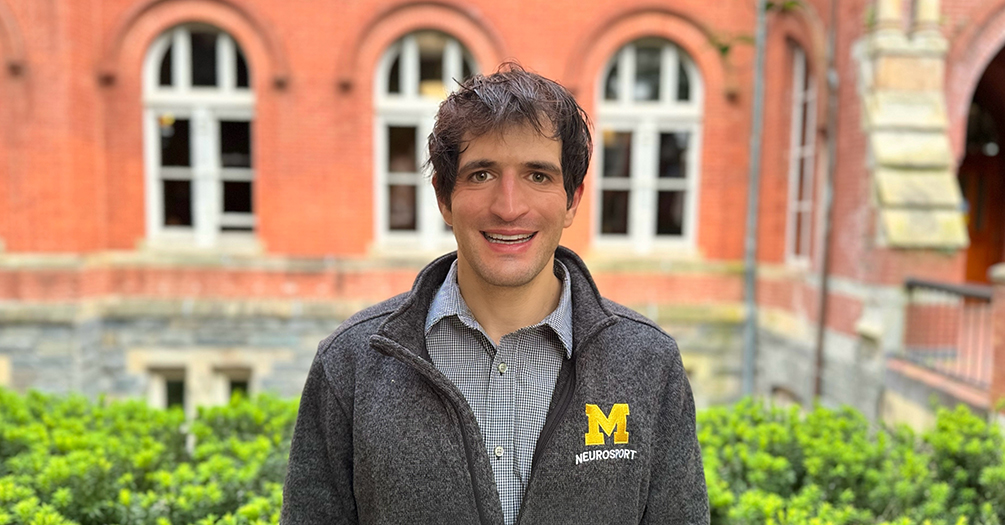Alumnus melds compassion with public health at Medstar Health

Nicholas Streicher, MD, MPH ’20
Health Behavior and Health Education
For Nicholas Streicher, MD, MPH ’20, the path to a career in medicine was paved not only with the tangible tools of the trade—the degree, stethoscope, the blood pressure cuff—but also with the intangible qualities of sensitivity, compassion and understanding.
Streicher’s journey into medicine was driven by a desire to transcend the traditional confines of medical practice.
“My feeling was that I wanted to do something different,” he said. “The practice of medicine can be insular—where doctors only see a small part of the healthcare landscape—but I wanted to be involved with how we communicate with patients and how public health policies intersect with people’s lives.”
He found the ideal foundation for that big-picture approach to healthcare at the University of Michigan.
“Michigan has an emphasis on the broader issue of how we help patients make decisions related to their healthcare and how we make those decisions as a society,” Streicher said. “As physicians, we are not always trained to look at the broader aspects of medicine, but the School of Public Health has that focus.”
The practice of medicine can be insular—where doctors only see a small part of the healthcare landscape—but I wanted to be involved with how we communicate with patients and how public health policies intersect with people’s lives.”
Streicher completed his undergraduate studies at the University of Michigan, earning a bachelor’s degree in Molecular, Cellular, and Developmental Biology from the College of Literature, Science, and the Arts. After getting his medical degree from New York University, he returned to Ann Arbor to earn a Master of Public Health degree in Health Behavior and Health Education.
Streicher’s family history is deeply connected to medicine and research. His great-uncle was a director at the National Institutes of Health (NIH) in the 1970s. His father is a physician who worked at NIH with Dr. Anthony Fauci during the HIV pandemic in the 1980s. His 101-year-old grandmother, who currently lives in New York City, was a nurse during World War II.
“I grew up around people in medicine who were involved with public health and were aware of the public need,” Streicher said. “Public health adds perspective to medicine. It helps one see the system problems and work to address them.”
After medical school, his extensive medical training included a neurology residency at the University of Iowa and a fellowship in neuromuscular medicine at the Weill Cornell Medicine and Hospital for Special Surgery.
He currently serves as an assistant professor at MedStar Georgetown University Hospital in Washington, DC, where he specializes in neuromuscular diseases, contributing to patient care, research and clinical trials with an emphasis on data-driven approaches. His work is guided by a deep understanding of the impacts of treatment on patients, navigating diverse populations and clinical landscapes.
Additionally, Streicher completed a fellowship in Sports Neurology at Michigan Medicine and treats sports-related concussions. He said the long-term impact of sports-related concussions is linked to public health.
“There is a risk involved in these sports, which becomes a public health issue—what degree of risk we accept not just as individuals but as a society,” he said.
The DC native said Michigan Public Health was his top choice for its strong foundation in public health and its reputation for excellence.
Every patient deserves concentrated attention and personalized treatment. It’s important to listen to patients to understand not only what they are telling you about their medical history but also what they are telling you about their personal history.”
“Michigan has a long history in public health dating back to Jonas Salk and his work on vaccines,” said Streicher, who was a member of the Running Club and wrote for the Michigan Daily at the university. “At Michigan Public Health, you receive a broad and connected experience, with balance between academics and student life.”
Streicher’s Michigan Public Health experience impressed upon him the value of a collaborative approach to care.
“Treating patients with complex diseases requires teamwork and multidisciplinary care,” he said. “Neurologic diseases can be challenging, but collaboration can improve the overall level of care.”
No matter the complexity of the case or the challenges it might present, Streicher finds significant value in listening to patients.
“Every patient deserves concentrated attention and personalized treatment,” he said. “It’s important to listen to patients to understand not only what they are telling you about their medical history but also what they are telling you about their personal history.
“My time at the University of Michigan School of Public Health gave me the tools and perspective to make a difference in the lives of my patients.”
